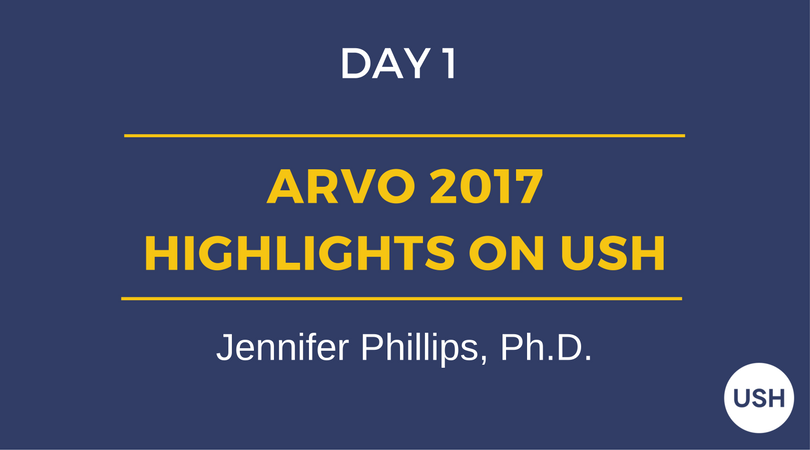ARVO 2017 Day 1 Highlights
May 8, 2017
by Jennifer Phillips, Ph.D.

I’m in Baltimore for the annual meeting of the Association for Research in Vision and Ophthalmology. Here’s a quick rundown of a few highlights from Day 1:
Thing 1: There’s rare, and then there’s rare. Usher syndrome on the whole is a rare disease, but within USH there are huge differences in the numbers of people affected by the various types of Usher syndrome. The newest addition to the list is USH1J, described ~5 years ago by Zubair Ahmed’s lab, is caused by a gene called CIB2. Like many other USH genes, some mutations cause nonsyndromic deafness, while others cause the syndromic deaf-blindness of Usher syndrome. At this moment in time, a handful of deafness cases have been linked to various mutations in CIB2, but there is only one family on earth with a confirmed diagnosis of USH1J. That number will certainly increase at some point, but probably not by much. Nevertheless investigating how changes in CIB2 can cause USH (even rarely) will help us understand more about USH overall, and I’m glad to see the Ahmed lab continuing to investigate this gene
Thing 2: We’re learning more and more about how to build retinas from non-retinal cells. I’ve blogged quite a bit previously about the success Budd Tucker’s lab has had obtaining stem cells from patient-donated skin cells and then inducing those stem cells to grow into retinal tissue. The molecular code to achieving this is complex, and our knowledge of it relies not only on work with human cells but with animal models as well. Andrea Viczian, PhD, gave a great presentation on her work using the leopard frog to understand how to program cells to become eye. Comparing how different vertebrates achieve this cellular specification is incredibly informative at the basic research level (at least to some of us!). But knowing more about which parts of the ‘make an eye’ instructions are inflexible and which parts can tolerate some variation can help us fine tune the human health applications as well.
Thing 3: The opportunity to find out about research before it’s published is priceless. One of the Usher projects I’ve been working on over the past year has been giving me consistently frustrating results, based on expectations derived from a previous ARVO presentation. Today I had the opportunity to speak with some researchers who are working on a related project, who’ve experienced the same frustrations and talking with them made the way forward for my own work abundantly clear. Meetings are time consuming and expensive, and sometimes it can feel like a sacrifice to put everything else on hold in order to attend a long, intensive meeting like this one, but the effort is always validated.
Looking forward to a full day of posters and talks tomorrow. See you back here then.







